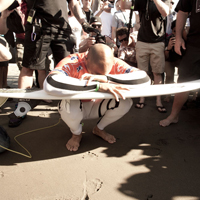
Video Gaming Platform Preferences by Gender–Chart from Label Networks’ Fall Youth Culture Study North America
While we’ve been tracking youth culture markets of 13-25-year-olds in video gaming preferences since 2000, in the last 2 years, and then again in the last 6 months, there have been some notable changes in patterns based on a new crop of gamers. These gamers more specifically, include female gamers and younger new gamers in general who continue to have different preferences not only in gaming titles, but also gaming console preferences.
As we’re noted before, older demographics have higher percentages playing video games longer than younger demographics. The interesting part about this is that the video gaming industry continually says that video gaming is a younger person’s entertainment characteristic but this isn’t quite true. A recent article in the Wall Street Journal yet again noted the “discovery” among the industry that so-called male core gamers are a decreasing market opportunity and times have changed. The average age gamer is actually much older than most people think at 32-years-old, which hardly accounts for it being youth culture. You can see this clearly in our results from our Fall Study 2009 from North America.
What’s also interesting is that while females 13-25-year-old still average less gaming time per day at 1.1 hours than males, this is a significant increase over the last several years, and last 2-3 years in particular based on the increase in preferences for certain games played on Wii, plus non-gender games such as Activision Blizzard’s Guitar Hero and Viacom’s MTV Games’ Rock Band. Interesting however is that many newbie gamers, including females, often say “I’m not really a gamer -I just play Guitar Hero [or Rock Band] when I’m at a friend’s house.” This is a new shift in the dynamics of who exactly, is a gamer.
To compare, this shift in dynamics can also be found in sports. For example, with youth culture today if you ask “Do you play sports?” or “Do you consider yourself an athlete?” Often younger demographics will say no to both, even though they may skateboard daily and ride their bike. The reason is that the word sports carries many meanings to this new generation, including “team” sports, and/or can often have a negative connotation to it such as being considered a jock. And being nerdy is far more popular today than being a jock.
The same can be said of gaming and “gamers.” Especially among females who don’t want to be considered the typical prototype of a male, unsocial gamer. If you play games, such as Rock Band, with friends as a part of your social entertainment, many people don’t necessarily equate that with actually playing a video game.
Social networks have also changed the dynamics of gaming. For example, Facebook’s FarmVille by Zynga is a simulation game that’s picking up speed for certain Facebook users. So while others say they don’t play games, but do play social networking games, this too can be confusing in understanding who exactly, is a “gamer.” In addition, more young people are playing games on their mobile phones which again some people don’t consider a “video game” per se but rather a part of their lifestyle to occupy their time while waiting for something or someone.
Of the major video gaming publishers, EA gets cred for doing the most research on the female gaming marketplace, having found an opportunity through titles such as Littlest Pet Shop. But of course this was because of Ubisoft’s Petz and fashion game StyleLab’s popularity among females. According to Wedbush, a 5% increase in female players could equal almost $1 billion in new revenue a year. So there’s a reason that gaming publishers started to see why capturing this so-called new market was vital. Some credit The Sims phenomenon for setting new market trends for girl-gamers (and the value of this) but it extends, obviously, beyond such simulation titles, including the growing number of gamers (female and male, but basically non-core-male gamers) stoked on Rock Band and Guitar Hero titles, Dance Dance Revolution titles, and of course Wii games, including an entire line of fitness titles.
The crossover potential into other industries is immense. For example in fashion, Uniqlo is constantly on the cutting edge of gaming-like applications both at their home site and mobile phone applications. H&M has also tapped into using gaming as a platform for design and interaction among consumers, and of course the music industry has scored with rock-band simulation titles that have recreated entirely new market opportunities via music sales, merch, especially for old-school rock bands, and even home-recording equipment.
Going back to our data, when it comes to gaming platform preferences, Xbox 360 is #1 at 40.9%. Second is Wii at 24.7%. However Xbox is highest among males at 54.8% with the #1 choice among females being Wii 34.8% indicating sharp differences by gender but also new video gaming players. This should be noted as more, newer gamers are coming in preferring this platform, as well as mobile platforms in general.
By age groups, Xbox is highest among 18-20-year-olds at 48.6%, whereas Wii is highest among 13-17-year-olds at 21.1%. It should also be noted that younger demographics continue to have higher percentages that prefer Online gaming.
Finally, in a nod to the growing Asian gaming market (read our stories on China gaming and social network apps for more), the lines between young people who already live virtual lifestyles and their avatars continues to blur even more. The new Playstation Eye camera now offers up a Face Recognition Library so that a player can use a scan of their face which is then digitized/animated like a game, but uses the real users’ expressions. So basically, their avatar is themselves sort of. You’re still anaynomous because the Face Recognition is an avatar-version of you. As confusing as this sounds, it’s already catching on as the next big thing in Japan. Which of course will translate to North America soon enough.
For those interested in tapping into more gaming culture, avatar lingo, and social interaction, we recommend you also go to watchtheguild.com and check out the popular webisode series created by Felicia Day abuot a group of gamers dealing with real-life and virtual gaming issues.


